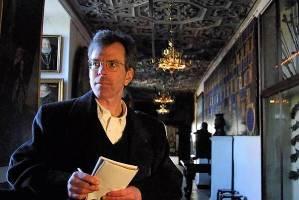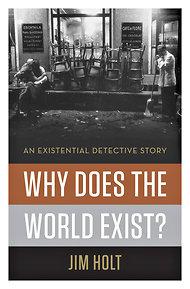 Jim Holt is an essayist and critic, but for his latest book he put on his "existential detective" hat and followed the trail of investigations into the origins of the universe. Why Does the World Exist? (Liveright, July 16) explores some of the common beliefs about how we came into existence, but also blazes trails off of the beaten path, broadening the discussion into something more than the sum of philosophy, physics, and spirituality. The result is a fascinating, broad look at humanity that also delivers on a personal level, with Holt's own life taking some existentially challenging turns during the narrative. Why Does the World Exist? is also significantly funnier than anything Martin Heidegger put to paper.
Jim Holt is an essayist and critic, but for his latest book he put on his "existential detective" hat and followed the trail of investigations into the origins of the universe. Why Does the World Exist? (Liveright, July 16) explores some of the common beliefs about how we came into existence, but also blazes trails off of the beaten path, broadening the discussion into something more than the sum of philosophy, physics, and spirituality. The result is a fascinating, broad look at humanity that also delivers on a personal level, with Holt's own life taking some existentially challenging turns during the narrative. Why Does the World Exist? is also significantly funnier than anything Martin Heidegger put to paper.
Your book is more than a survey of thinking around the topic; part of the title is An Existential Detective Story, and a good detective doesn't investigate a question without hope of a solution. Did you set out to do a survey or to solve the mystery, or neither?
A good detective looks beyond the usual suspects. And when it comes to cracking the mystery of existence--why is there a universe rather than nothing at all?--the usual suspects are God and science. If you are a religious believer, you think the world exists because an eternal self-subsistent deity brought it into being. If you are a neo-atheist, you think--you hope!--that science can account for how our universe popped into existence out of nothingness in a primeval Big Bang. That's been the big back-and-forth argument in the recent "God wars."
I wasn't happy with either of these possibilities. I'm personally skeptical of religious metaphysics. And science can't really explain how something can arise from nothing; it only tells you how something arises from something else. Even if, as Lawrence Krauss has argued in A Universe from Nothing, the laws of physics can account for the emergence of space and time out of a state of pure nothingness, the status of those laws remains puzzling. As Stephen Hawking commented, "What breathes fire into the equations and makes a universe for them to describe?"
So, in playing the existential detective, I was determined to go beyond God and physics. But who or what could the other cosmic suspects be? As it happened, I got my clues by talking to some of the greatest living physicists and theologians--people like the physics Nobel laureate Steven Weinberg, the eminent Oxford theologian Richard Swinburne and the brilliantly speculative quantum-computation expert David Deutsch. Their own insights and perplexities led me to pursue my investigation down some unexpected metaphysical alleys.
What were the biggest surprises for you in researching and interviewing for this book?
How bizarre some of these alleys turned out to be. Could the world ultimately exist because it fulfills an abstract need for goodness? That sounds like a daft idea, but a distinguished Canadian cosmologist by the name of John Leslie nearly persuaded me it was true. Or might the rather messy world that we live in be a kind of reflection of perfect and eternal realm of mathematical essences? That's what Plato believed in ancient times, but it also, to my surprise, turned out to be pretty much what the great Oxford physicist Roger Penrose seemed to be convinced of when I talked to him. Perhaps the craziest notion I encountered was that absolute nothingness was like an annihilating force that somehow "nothed" itself, thereby engendering a world of being.
I guess the main thing that surprised me was that, if you let brilliant and profound thinkers do their thinking out loud, they eventually say things that are not dissimilar to what we used to say back in college in our cosmic rap sessions in the late-night hours. By the way, I was also surprised how my pursuit of the mystery of cosmic existence led me to ponder more deeply the mystery of my own existence, and how it would come to an end in the nothingness of death. There's a lot of death in the book--John Updike's, Claude Lévi-Strauss's, my dog's, my mother's and nearly my own.
 There's a quotation in the book from Allan Sandage, "the father of modern astronomy": "Science cannot answer the deepest questions. As soon as you ask why there is something instead of nothing, you have gone beyond science." Do you agree? Do you think it is necessary to draw a distinction?
There's a quotation in the book from Allan Sandage, "the father of modern astronomy": "Science cannot answer the deepest questions. As soon as you ask why there is something instead of nothing, you have gone beyond science." Do you agree? Do you think it is necessary to draw a distinction?
Well, another great scientist--John Archibald Wheeler, who coined the expression "black hole"--famously said, "We demand of physics some understanding of existence itself." But can physics ever meet that demand? The physicist Lawrence Krauss, in his book A Universe from Nothing, claimed that it could. But his case got pretty much demolished in a brutal review by the Columbia physicist and philosopher David Albert in the New York Times. When scientists try to explain why there is something rather than nothing, they tend, whether they realize it or not, to smuggle metaphysical assumptions into their reasoning. They also fall into circularity by trying to make Nothing into a Something--a quantum vacuum, a closed spacetime of radius zero and so on.
At risk of spoiling the book: Why does the world exist?
The answer to that question takes shape near the end of my book, after I have returned to All Souls College at Oxford and encountered the amazing Derek Parfit, one of the most profound philosophers alive. Instead of spelling out the answer explicitly, let me just say that it comes down to two principles: Simplicity and Fullness. Simplicity is a modern scientific principle: science always reaches for the simplest hypothesis. And Fullness (or Plenitude) is an ancient philosophical one, going back to Plato: the Great Chain of Being and all that.
But here's the great irony. Even though the principles of Simplicity and Fullness combine to explain the most general form that reality takes, they do not imply that the world should be either simple or full. (After all, the simplest world would be a world of nothingness.) Rather, they imply that reality is infinitely incomplete, messy and mediocre--a conclusion that is increasingly borne out both by cosmological investigation and by our own everyday experience, our finite existence in the shadow of death. --Matthew Tiffany, counselor, writer for Condalmo

